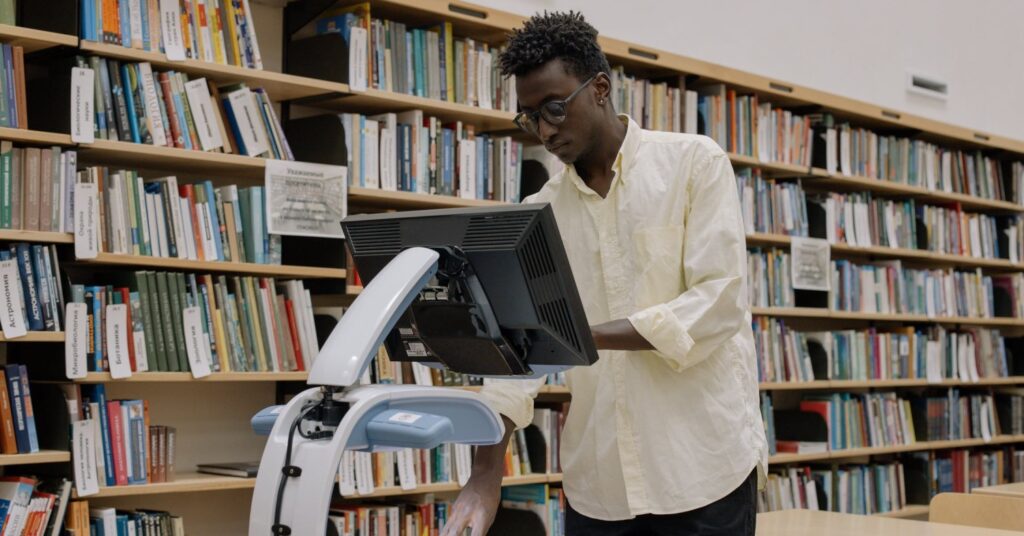
Top 9 Program Manager Skills
Competent program managers must possess communication, management, leadership, critical thinking, [...]

Libraries—those public spaces widely regarded as antiquated, fusty repositories of mildewed tomes—are actually nothing of the sort. In actuality, contemporary libraries are hotbeds of technological advancements in sync with our digital age. Since the rise of the internet in the 1990s, modern librarians and other information professionals have kept pace with new tech developments to ensure that patrons have “digital equity” and can access the technology to find information essential for work and study.
A recent article in the Columbia Missourian profiled Jan Summers, a librarian who began her career fifty years ago as a library media specialist. Throughout her librarianship, she embraced and mastered new advances in technology, but always focused on the core mission of her work—learning “all sorts of ways to find, organize and present information.”
Summers’ librarianship developed alongside the rise and eventual dominance of digital technology. She recalls going from using scissors to clip articles from newspapers for the Columbia Tribune’s news library’s reference files in 1984 to spending 20 minutes at the end of every day in 1992 backing up the Hickman High School library’s system to 12 floppy disks.
While the Hickman library was employing a Listserv and the limited Gopher protocol-based VERONICA search engine for research when she first started, Summers was encouraged by the head of the library to seek out more advanced resources on the still-developing internet for students’ use. Of this time, Summers’ commented, “The World Wide Web changed everything…It was fun, and it was exciting.”
The core of Summer’s job stayed the same throughout her tenure; mostly, the tools of her trade were what changed. Adapting to new technologies became one of her greatest and most helpful skills. Julie Ryan, Hickman’s current library media center clerk, notes, “I think what’s so neat about Jan is that she always wants to learn about new trends and new technologies, but she also understands what her knowledge contributes to what we need to know now, too.”
Summers acknowledges that welcoming change is a challenging but essential component of librarianship: “It’s very true — old dogs, new tricks — it’s really hard. And if you have to change your whole perspective on (technology), give yourself some grace. Don’t be afraid of it, ask for help.”
What other skills are essential to launching and developing a successful career in library science? This article summarizes seven of the most important.
A love of the profession contributes to a successful career in library and information science. What other qualities and skills keep librarians at the top of their game?
As Jan Summers’ story illustrated, perhaps the most crucial study-based skill area for librarians is technology. Integrated library systems (ILS) software is one part of this equation, but for university and K-12 school systems, librarians should have working knowledge of Apple and Microsoft operation systems, instructional design products, literacy software, intellectual/copyright management systems, and integrated search tools. Since information technology constantly evolves, librarians need to be committed to career-long learning to maintain their proficiency in this area.
Keeping pace with changes in technology, pedagogy, policy, and culture is critical to staying relevant and competent in a library and information science career. Librarians and information science professionals in commercial or academic settings contribute to the overall success of the larger institution, so it is vital that they be skilled in change management to help cultivate and support organizational culture, leadership, and staff that is flexible enough to accommodate necessary changes quickly and seamlessly.
Archivists and information professionals need to use and embrace creativity, innovation, initiative, and independent judgment to create and develop relevant and compelling library services for patrons. These skills support effective outreach to surrounding communities and provide helpful resources for children and young adults through youth services and education programs.
Literacy is a core focus for library and information science professionals, and digital literacy presents its unique challenges. Being able to locate, evaluate, and communicate information through new technology is critical for maintaining digital libraries, updating curricula for school libraries, and teaching digital writing with hypertext, audio, and visual design. As well, it’s vital for librarians to be able to teach students to always seek out context, imagine technological alternatives, and build their agency when engaging with digital information.
Managing digital information includes not only records management, but the identification and preservation of special collections, video files, photographic images and scanned documents, and graphics. With massive amounts of data to catalog and index, this likely represents a significant part of a librarian or curator’s job, and it must be done well.
Collaboration with diverse communities and populations, other libraries, schools, and nonprofits, as well as with individuals in local government and social services, can be a great benefit to both the library and the communities they serve. These relationships can be very helpful in times of crisis, as when stepping up during a pandemic or after catastrophic weather events. It can also help find gaps in services for underserved groups.
It’s now important in any industry to be savvy in marketing and social media. Librarians need to utilize these tools to stay relevant and connected to young adults, to reach populations that are more difficult to reach and to draw people into the library. Maintaining an impactful social media presence can help locally and create a global presence for advertising events, programming, and information services.
The American Library Association has its own list of “What Librarians Need to Know” with recommendations for skills, experience, and levels of education. A master’s degree in library science (MLS) or in library and information science (MLIS) from an ALA-accredited school is recommended. Let’s look at what an MLIS program is and what it can do for your career.
Library and information science (LIS) constitutes a category of professions that follow the values and core competencies of librarianship outlined by the American Library Association (ALA). The master’s programs that cover LIS are a family of library science degrees, including the MLIS, MLS, and Master of Science in Library Science (MSLS).
The American Library Association oversees these master’s programs; all ALA-accredited master’s programs have met the ALA Committee on Accreditation’s “Standards for Accreditation of Master’s Programs in Library and Information Studies” and undergone external review. There may be several designations for this family of degrees, but their curricula share common content and admissions requirements.
Earning your master’s degree in library and information science typically takes two to three years of full-time study, depending on whether a student chooses online learning or in-person studies. Some programs offer accelerated tracks for students with a bachelor’s degree in library science or information science.
You’ll find coursework that covers both core courses in areas like the foundations of information systems, research methods, and information organization, as well as credit hours for electives in areas like information architecture, cultural perspectives, social justice, information services and evaluation, and information management. Most library science programs finish with fieldwork or a capstone internship.
Programs offer specializations in areas like legal and health informatics, literacy, digital libraries, school media, academic librarianship, archival studies, public librarianship, youth services, and information law, policy, and ethics. These choices vary by program, so make sure you consider your specialization area of interest when doing your master’s program research.
A number of top schools offer MLIS degrees and dual degree programs. Many provide both in-person and online programs to accommodate the work and time commitments of busy graduate students.
Choosing a school that best fits your area of interest is important, so you’ll need to do some research and ask lots of questions to find the right school.
Top schools for library and information science include:
(Last Updated on February 26, 2024)
Questions or feedback? Email editor@noodle.com

Competent program managers must possess communication, management, leadership, critical thinking, [...]

Product management is a skill-based field where work experience can [...]

Product managers strive to develop products to meet ever-changing customer [...]

Available product management certification courses include Agile Certified Product Manager [...]

Cyberthreats arrive at a volume and threat level beyond what [...]
Categorized as: Library Science, Education & Teaching